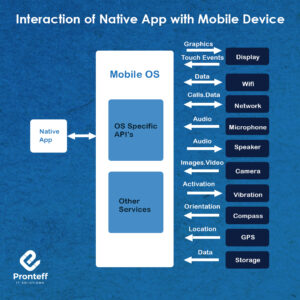Native Vs Hybrid App Development for Mobile Application
Are you planning to construct a Mobile Application using Native Vs Hybrid App Development for your enterprise? Do you want to launch your apps faster to your cease-person? – however no longer certain which type of development approach to select? A modern net app, native app, or hybrid app? If yes, this blog is for you. In this blog publish, we are able to examine both local and hybrid app development. We will help you determine out which improvement approach works properly for your needs. So, Let’s bounce right into it!
Understanding the Difference between Native Vs Hybrid App Development:
Native Apps:
A native app refers to an app constructed absolutely using technologies Native to a specific OS which could be Android or iOS. For iOS, Native apps are normally built by the usage of Objective-C or quick even for android, native apps may be built by the usage of java or kotlin. As Native apps are built completely for a selected operating device, it interacts at once together with your mobile working device without the assistance of any intermediate bridge or field software. Since native apps can engage with a huge variety of hardware available in your device, they exhibit more speed, performance, and efficiency. Since native apps are loose to get admission to all the APIs which are made available by means of the operating gadget, they always have the appearance and feel this is traditional of that unique operating system.
Let’s see
How native apps interact with mobile devices:

Native App Development:
In order to build a native app, you need to start with writing the source code of your utility and construct extra assets along with configuration data & diverse platform-particular statement documents. Then you have to use tools provided by way of the operating gadget to bring together the source code. Sometimes you regularly need to hyperlink it on the way to create an executable in binary form. Then you want to bundle that binary executable with the sources of the app so that you can achieve a package deal that may be disbursed to the cell devices via an app shop or another approach. These gear and a few different utilities and files are generally called the SDK of the mobile OS. The SDK is platform-unique and each mobile OS comes with its very own precise equipment however the procedure is pretty comparable for them all.
Advantages of Native App
- Native apps are faster and show high performance when compared to other apps as they are specifically built to run on a particular operating system.
- Native apps can be easily distributed and published in app stores as the approval process for native apps is faster when compared to hybrid apps.
- Native apps have extensive APIs to interact with your mobile device’s hardware such as gyroscope, camera, storage, NFC, Bluetooth, etc.
Hybrid Apps:
Hybrid apps are growing in popularity these days. This is because of their pass-platform functionality and cheaper improvement value whilst in comparison to Native Mobile apps. The massive advantage of hybrid app improvement is which you simplest want to put in writing a single codebase for all operating frameworks. Technically, a hybrid app may be described as a native app with embedded HTML. Hybrid apps are built using a cross-platform framework such as Flutter, React Native, and so on, and are then wrapped with native-specific code for every favored mobile platform. So in different words, hybrid apps are certain websites located into a native app that promises users a close-to-native mobile app revel in. Certain portions of the hybrid app are written the usage of web technologies and the internet portions of it may be either packaged inside the app or downloaded from the internet.
Hybrid App Development:
A hybrid app is simply an internet app that is packaged into a native app. So we first have to construct that. The native app must be coded in a manner that launches the HTML rendering engine anyplace suitable. Now that we’ve got a native app, there are primary approaches we are able to get the HTML, CSS, and JavaScript documents into that app. The first manner is the extra conventional way. In this technique, you need to take the HTML sources and area them on a web server. Your app will then educate the rendering engine to browse to the webserver you assigned. However, this method has a mild disadvantage as it introduces a put-off. Your HTML pages received’t get displaced till they’re downloaded from the server. One of the biggest blessings of this method is that, even though the HTML portions of your app have minor updates, you could make the modifications without requiring your app to be submitted again to the app shop. The other manner is to package deal the HTML sources in the distributable package deal of the app. If the net assets are packaged inside the app, it manner that there’s no delay for the person because the HTML and different files are retrieved without delay from the document system of the device. However, faraway updates aren’t viable with this technique.
Advantages of Hybrid App
- You only need a single codebase for all platforms
- Hybrid apps are way faster and easier to develop when compared to native apps
- They are much cheaper to develop than a native app
- They can access your device’s internal APIs that can access hardware components such as Bluetooth, camera, storage, etc.
Native Vs Hybrid App Development: Final Version
If you need to build a mobile app with a constrained price range, then hybrid app development is the only for you as you best need to hire a mobile app developer from an offshore software development company in Hyderabad in place of hiring separate developers for iOS and Android.








